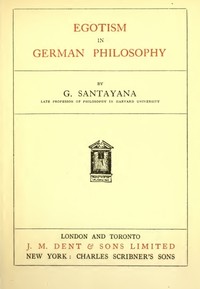Egotism in German Philosophy by George Santayana
"Egotism in German Philosophy" by George Santayana is a philosophical work written in the early 20th century. The book explores the nature of German philosophy, emphasizing its subjective and egotistical core, as well as its implications in the broader context of culture and morality. Santayana presents a critical analysis of German philosophical thought, particularly focusing on figures like Kant, Fichte, and Hegel, and argues that their ideas often reflect an overemphasis on
the individual self at the expense of reality and communal values. The opening of the book lays the groundwork for Santayana's critique, revealing his perspective on German philosophy as fundamentally flawed yet influential. He expresses his skepticism about its validity and laments the pervasive egotism he perceives in its core tenets. Santayana introduces his views on the subjective nature of thought and the tendency of German philosophers to glorify this egotism, suggesting that it has contributed to a distorted understanding of existence, duty, and moral responsibility. By outlining the philosophical landscape, he sets the stage for a deeper examination of individualism versus collective experiences and the philosophical reflections that shape societal values. (This is an automatically generated summary.)
Read or download for free
| Reading Options | Url | Size | |||
|---|---|---|---|---|---|
| Read now! | https://www.gutenberg.org/ebooks/48431.html.images | 269 kB | |||
| EPUB3 (E-readers incl. Send-to-Kindle) | https://www.gutenberg.org/ebooks/48431.epub3.images | 171 kB | |||
| EPUB (older E-readers) | https://www.gutenberg.org/ebooks/48431.epub.images | 172 kB | |||
| Kindle | https://www.gutenberg.org/ebooks/48431.kf8.images | 252 kB | |||
| older Kindles | https://www.gutenberg.org/ebooks/48431.kindle.images | 225 kB | |||
| Plain Text UTF-8 | https://www.gutenberg.org/ebooks/48431.txt.utf-8 | 235 kB | |||
| Download HTML (zip) | https://www.gutenberg.org/cache/epub/48431/pg48431-h.zip | 154 kB | |||
| There may be more files related to this item. | |||||
Similar Books
About this eBook
| Author | Santayana, George, 1863-1952 |
|---|---|
| LoC No. | 2008570683 |
| Title | Egotism in German Philosophy |
| Credits | E-text prepared by Marc D'Hooghe (www.freeliterature.org) from page images generously made available by Internet Archive (archive.org) |
| Reading Level | Reading ease score: 52.1 (10th to 12th grade). Somewhat difficult to read. |
| Language | English |
| LoC Class | B: Philosophy, Psychology, Religion |
| Subject | Philosophy, German |
| Subject | Egoism |
| Category | Text |
| EBook-No. | 48431 |
| Release Date | Mar 8, 2015 |
| Most Recently Updated | Oct 24, 2024 |
| Copyright Status | Public domain in the USA. |
| Downloads | 417 downloads in the last 30 days. |
| Project Gutenberg eBooks are always free! | |

